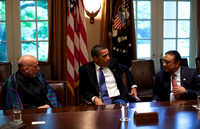At the heart of the U.S. war in Afghanistan lies a striking and unresolved contradiction. While the U.S. has sent approximately 100,000 troops to this impoverished, landlocked country to combat a fearsome local insurgency, the actual focal point of U.S. policy in the region largely revolves around protecting and stabilizing a country just across Afghanistan's eastern border: Pakistan.
It's an ironic but not altogether surprising strategy. After all, Pakistan remains home to Osama bin Laden, his key lieutenants and other terrorist organizations intent on striking American targets. The country maintains a significant nuclear capability, and its ongoing conflict with India has the potential to spark a regional conflagration.
Yet, for a policy that is so apparently solicitous of Pakistani needs, it is quite disconnected from actual Pakistani interests, particularly with regard to Afghanistan. In fact, the campaign to coax the Pakistani military into turning against its Afghan Taliban allies as well as the U.S. military strategy in Afghanistan that seeks to defeat the Taliban and strengthen the government of Afghan President Hamid Karzai undermines rather than furthers Pakistan's interests. In essence, U.S. policy consists of political and diplomatic efforts to convince Pakistan to act against its perceived interests. Instead, the United States needs to more seriously address Pakistani concerns about Afghanistan's future.

